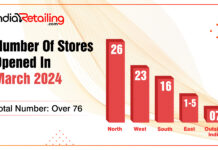Leaders from convenience store formats discuss strategies for getting impulse grocery right at India Food Forum 2022
Mumbai: Panelists in a session in India Food Forum 2022 said the convenience store segment is growing rapidly in India primarily driven by quick-to-grab items and impulse purchasing.
“Things that are consumed within one hour of purchase are sold at a convenience store. This is a format that is driven by impulses,” said Aastha Almast, founder, The NEW Shop that has 100 convenience stores across India in just two years.
World-over the convenience store format, that is driven by retailer like 7-Eleven, is a trillion-dollar industry, globally. Over the years, India has spawned more than 30 convenience store chains generating billion dollars of business as a whole.
Almast was speaking as part of the panel discussion ‘Winning Ways to Excel in Food & Grocery Business’ at the 15th edition of India Food Forum 2022, the mega congregation of India’s emeriti of the Food Retail establishment at The Westin Mumbai, Powai Lake on December 7-8.
She was joined by Hardeep Singh, CEO, 7 – Eleven; Prashant Peres, MD, Kellogg South Asia; Sanjay Singal, COO – Dairy & Beverages, ITC; Srinandan Sundaram, Executive Director – Foods & Refreshment, HUL; Varun Khurana, Founder & CEO, Otipy in the session that was chaired by Damodar Mall, CEO Grocery Retail, Reliance Retail and Chairman India Food Forum 2022
Although Damodar Mall, chief executive of food retailing at Reliance Retail, is of the views that convenience shopping is best served in India rather than in anywhere else in the world, thanks to the several kiranas and mom and pop stores dotting every neighbourhood, convenience stores as a format is still emerging in the country as opposed to developed markets.
Here’s what the panelists think convenience stores in India are doing wrong:
Category silos
“The first problem lies in the way we look at impulse grocery. We all are guilty of building category silos and not understanding the interplay of things that can happen in this space of impulse grocery,” Hardeep Singh, CEO, 7 – Eleven pointed out.
He shared that one of the most bought impulse buy combinations at the 7 – Eleven chain of convenience stores is cold coffee Tetra Pak and a sandwich, which is a highly unlikely combination, he shared. “The moment we open our minds to understanding the interplay between categories, the whole world of impulse grocery starts to grow. We need to go beyond putting gums, candies and jellies at the POS for inspiring impulse purchases,” he added.
The New Store’s affinity revealed that the two of the most commonly sold products at their stores are cigarettes and KitKat, instead of cigarettes and mint.
“A lot of boundaries between planned and impulse are blurring,” said Sanjay Singal, COO – Dairy & Beverages, ITC.
Thinking single channel
“The larger pie lies in offline. A lot of smaller brands have made the mistake of not planning omni-channel and that’s what prevents them from growing,” said Almast.
Millennials and GenZ customers seek new brands and experiences, which is fueling the growth of several D2C brands. “With more avenues coming a brand is now able to scale up to Rs 70 to Rs 100 crores. There are no digital-only brands that are Rs 1000 crores,” Srinandan Sundaram, Executive Director – Foods & Refreshment, HUL said.
“Be where the consumer is. Our brand is present on 12 channels. The larger pie lies in offline. A lot of smaller brands have made the mistake of not planning omni-channel,” Almast said.
Ignoring Opportunities
Sin foods or guilt eating is an ignored category in impulse grocery. “In a convenience store, there are no boundaries,” said Singh.
Gifting is also emerging as an impulse shopping category. Singh gave an example of his store, where store-assembled gift hampers were gone before anyone knew it.
“The world of opportunities is so wide in impulse groceries,” he said.
“A lot of opportunities have opened up with e-commerce and quick commerce. As a brand, the opportunities have never been better. Times will only get better from here,” Varun Khurana, Founder & CEO, Otipy said.
Box
Other winning mantras
- Consistent product and service experience regardless of the channel.
- Attention to attractive packaging especially for D2C brands.
- Seamless integration of all channels.








